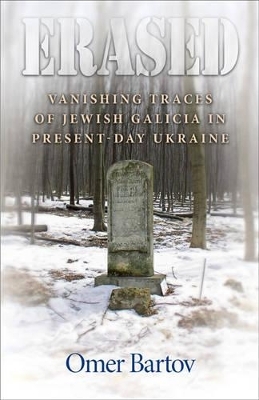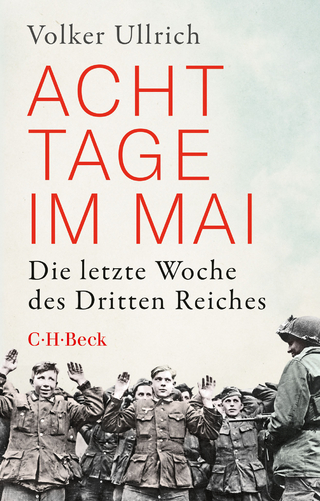
Erased
Vanishing Traces of Jewish Galicia in Present-Day Ukraine
Seiten
2007
Princeton University Press (Verlag)
978-0-691-13121-4 (ISBN)
Princeton University Press (Verlag)
978-0-691-13121-4 (ISBN)
Uncovers the rapidly disappearing vestiges of the Jews of western Ukraine, who were rounded up and murdered by the Nazis during World War II with help from the local populace. This travelogue reveals the erasure of the Jews and their removal from public memory, a blatant act of forgetting done in the service of a aggressive Ukrainian nationalism.
In Erased, Omer Bartov uncovers the rapidly disappearing vestiges of the Jews of western Ukraine, who were rounded up and murdered by the Nazis during World War II with help from the local populace. What begins as a deeply personal chronicle of the Holocaust in his mother's hometown of Buchach--in former Eastern Galicia--carries him on a journey across the region and back through history. This poignant travelogue reveals the complete erasure of the Jews and their removal from public memory, a blatant act of forgetting done in the service of a fiercely aggressive Ukrainian nationalism. Bartov, a leading Holocaust scholar, discovers that to make sense of the heartbreaking events of the war, he must first grapple with the complex interethnic relationships and conflicts that have existed there for centuries. Visiting twenty Ukrainian towns, he recreates the histories of the vibrant Jewish and Polish communities who once lived there-and describes what is left today following their brutal and complete destruction. Bartov encounters Jewish cemeteries turned into marketplaces, synagogues made into garbage dumps, and unmarked burial pits from the mass killings.
He bears witness to the hastily erected monuments following Ukraine's independence in 1991, memorials that glorify leaders who collaborated with the Nazis in the murder of Jews. He finds that the newly independent Ukraine-with its ethnically cleansed and deeply anti-Semitic population--has recreated its past by suppressing all memory of its victims. Illustrated with dozens of hauntingly beautiful photographs from Bartov's travels, Erased forces us to recognize the shocking intimacy of genocide.
In Erased, Omer Bartov uncovers the rapidly disappearing vestiges of the Jews of western Ukraine, who were rounded up and murdered by the Nazis during World War II with help from the local populace. What begins as a deeply personal chronicle of the Holocaust in his mother's hometown of Buchach--in former Eastern Galicia--carries him on a journey across the region and back through history. This poignant travelogue reveals the complete erasure of the Jews and their removal from public memory, a blatant act of forgetting done in the service of a fiercely aggressive Ukrainian nationalism. Bartov, a leading Holocaust scholar, discovers that to make sense of the heartbreaking events of the war, he must first grapple with the complex interethnic relationships and conflicts that have existed there for centuries. Visiting twenty Ukrainian towns, he recreates the histories of the vibrant Jewish and Polish communities who once lived there-and describes what is left today following their brutal and complete destruction. Bartov encounters Jewish cemeteries turned into marketplaces, synagogues made into garbage dumps, and unmarked burial pits from the mass killings.
He bears witness to the hastily erected monuments following Ukraine's independence in 1991, memorials that glorify leaders who collaborated with the Nazis in the murder of Jews. He finds that the newly independent Ukraine-with its ethnically cleansed and deeply anti-Semitic population--has recreated its past by suppressing all memory of its victims. Illustrated with dozens of hauntingly beautiful photographs from Bartov's travels, Erased forces us to recognize the shocking intimacy of genocide.
Omer Bartov is the John P. Birkelund Distinguished Professor of European History at Brown University. His books include "Murder in Our Midst: The Holocaust, Industrial Killing, and Representation" and "Hitler's Army: Soldiers, Nazis, and War in the Third Reich".
Introduction ix Maps xviii Chapter I: The Borderland 1 Chapter II: Travels in the Borderland 11 L'viv -- Sambir -- Drohobych -- Stryi -- Bolekhiv -- Ivano-Frankivs'k -- Kolomyia -- Kosiv -- Kuty -- Horodenka -- Husiatyn -- Chortkiv -- Zolotyi Potik -- Buchach -- Monastyrys'ka -- Ternopil' -- Berezhany -- Zolochiv -- Brody -- Zhovkva Chapter III: Return 199 Acknowledgments 213 Additional Readings 215 About the Author 225 Index of Names 227 Index of Place-Names 229
| Erscheint lt. Verlag | 7.10.2007 |
|---|---|
| Zusatzinfo | 6 Maps |
| Verlagsort | New Jersey |
| Sprache | englisch |
| Maße | 140 x 216 mm |
| Gewicht | 454 g |
| Themenwelt | Geschichte ► Allgemeine Geschichte ► 1918 bis 1945 |
| Geisteswissenschaften ► Geschichte ► Regional- / Ländergeschichte | |
| Geschichte ► Teilgebiete der Geschichte ► Kulturgeschichte | |
| Sozialwissenschaften ► Soziologie | |
| ISBN-10 | 0-691-13121-X / 069113121X |
| ISBN-13 | 978-0-691-13121-4 / 9780691131214 |
| Zustand | Neuware |
| Haben Sie eine Frage zum Produkt? |
Mehr entdecken
aus dem Bereich
aus dem Bereich
ein Psychologe erlebt das Konzentrationslager
Buch | Hardcover (2024)
Kösel (Verlag)
22,00 €
Mythos „Stauffenberg-Attentat“ – wie der 20. Juli 1944 verklärt und …
Buch | Hardcover (2024)
Goldmann (Verlag)
24,00 €
die letzte Woche des Dritten Reiches
Buch | Softcover (2023)
C.H.Beck (Verlag)
16,00 €


